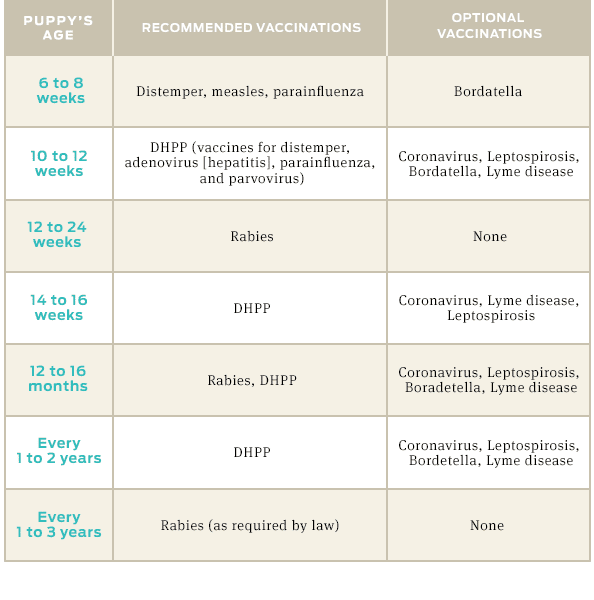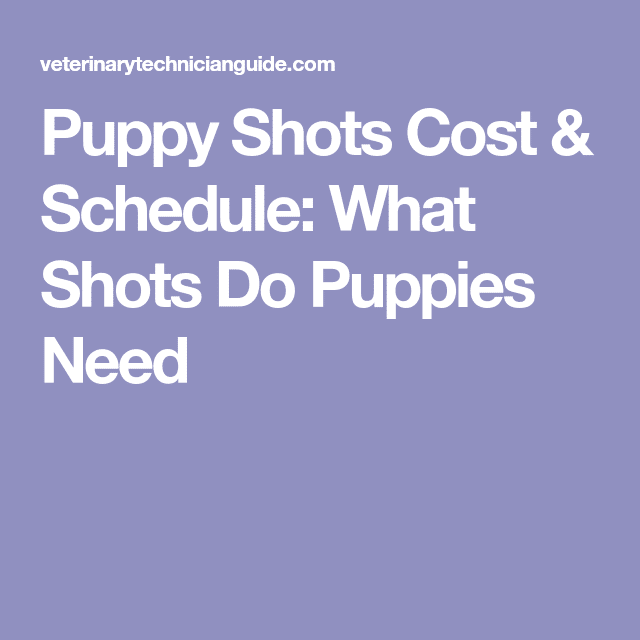What Vaccines A 68 Week Old Puppy Might Get:
- CORE: DA2P Combination shot protecting against Distemper, Adenovirus , and “Parvo.” This vaccine may be administered as a DA2PP, which is the same thing, but also includes protection against Parainfluenza .
- NON-CORE: Bordetella The initial vaccine can be given at this age if necessary or desired, depending on the type of vaccine used .
- NON-CORE: Canine Influenza Virus There are two different canine flu vaccines available, each protecting against a different strain of dog flu. When needed, a dog can receive this vaccine starting at either 6 or 8 weeks of age, depending on which of the vaccines they are receiving.Either way, a booster is needed 24 or 3 weeks later, again depending on which vaccine they are receiving, for the best protection.
Where your puppy can usually go and what they can usually do after this 68 week vaccine visit:
Socialization of puppies is critically important for their emotional and behavioral development, and it isn’t just about them being “social” with other dogs or even people. There are many “non-social” things that young puppies need to be properly exposed to early on. Check out our Pupstanding App with its fun, easy-to-use checklist to help socialize your pup.
912 weeks of ageDepending on your puppy’s age when you first got them, this may be their first visit to your veterinarian or their second. Either way, it’s an important visit.
What Vaccines A 1216 Week Puppy Might Get:
- CORE: DA2P Combination shot protecting against Distemper, Adenovirus , and “Parvo.” This vaccine may be administered as a DA2PP, which is the same thing, but also includes protection against Parainfluenza .
- NON-CORE: Bordetella The initial vaccine can be given at this age if necessary or desired, depending on the type of vaccine used .
- CORE: RabiesCan receive once over 12 weeks old. State and local regulations determine the age by which all dogs must be rabies vaccinated.
- NON-CORE: Leptospirosis The initial vaccine in a 2-part series in the first year. See below for more detail on what this vaccine covers against and why you or your vet might want to consider it.*Note: Because Lepto can be devastating to both your dog and you , and also because all dogs can be at risk , your veterinarian may highly recommend and consider this vaccine “core,” and may recommend starting the initial series more in the 9-12 week age range mentioned above.
- NON-CORE: Lyme The initial vaccine in a 2-part series in the first year. See below for more detail on what this vaccine covers against and why you or your vet might want to consider it.
Where your puppy can usually go and what they can usually do after this 1216 week vaccine visit:
1517 weeks of age
What Happens When Puppies Stay In The Litter Too Long
Socially speaking, the litter is a competitive environment. If the puppies stay in the litter too long they start to develop a pecking order and a strong pattern of dominant or submissive behaviors around their littermates. These carry over when they leave and can be a source of social and behavioral problems later on.
Don’t Miss: How Much Ounces Of Formula Should A Newborn Drink
Faq: How Many Shots And Vaccinations Do Puppies Need
Have you ever watched Brooklyn Nine-Nine? There’s a scene where one of the characters gets a new puppy , and the scene has been turned into a meme.
In it, she’s holding her sweet fur baby, and she says,
“I’ve only had Arlo for a day and a half, but if anything happened to him, I would kill everyone in this room and then myself.”
Now, this is an over-the-top comedic reaction, but really, we all love our puppies, and we’d do just about anything to see them kept safe.
One of the many things we can do for our newborn pups is to get them vaccinated against the awful diseases that can make their lives bad or even end them prematurely.
The question is, how many vaccinations are there, and how many do puppies need? Let’s dig in.
How Can I Safely Socialize My Unvaccinated Puppy

Of course, the first few weeks of your puppys life are crucial to their development, social development included.
Keeping your puppy locked up for too long without allowing them to socialize can create behavioral problems later in life.
One way that most vets agree is safe for socializing is to carry your puppy around with you. By not letting him touch the ground, youre keeping them as far away from bacteria and disease as possible.
You can also encourage friends and family to come into your home and visit, but we recommend leaving shoes at the door
Also Check: How To Get More Sleep With A Newborn
How To Socialise Puppies
In the first few weeks of a puppys life, they wont be doing much apart from sleeping and feeding,bBut once theyre around a month old, youll need to consider puppy socialisation. That includes interactions with both humans and dogs. This is an important step for boosting their confidence, decreasing anxiety, improving their social skills and reducing behavioural issues. Puppy socialisation plans are a useful way of covering things off.
There are a few great points to keep in mind when socialising your puppies. First off, take it slowly. Until around 8 weeks, puppies should be kept with their mum and siblings. Theyll learn most of their tips at this stage from their family. That includes bite inhibition and playing. Regularly handling them around this age will also help them to build trust with the people in your household.
Just remember, if a puppy appears to be unhappy with the interaction, calmly end it immediately. Its about creating good experiences, and a nervous dog will associate an experience with that feeling. Get to the floor to play and interact, encourage but monitor children and babies during social times to maintain a calm room. And most of all keep it short. Little and often is the best approach here.
Why Do Puppies Need Three Rounds Of Booster Vaccinations
When puppies are first born, they have natural protection against diseases due to maternal antibodies. These antibodies from their mother give them immunity for the first several weeks of their life. However, that natural immunity quickly wears off. Also, any vaccinations given to the pup while they still have these maternal antibodies may be ineffective.
Thats why we dont start vaccinations right away were waiting for those maternal antibodies to wear off.
Unfortunately, the speed at which these antibodies wears off varies from pup to pup. So were not exactly sure when your puppy is ready for vaccinations.
The window of susceptibility is what we call the period between your puppys protection from maternal antibodies, and your puppys protection from vaccinations.
Maternal antibodies can wear off at any point from 2 4 months. With our puppy vaccinations schedule, were trying to make sure your puppy is never vulnerable thats our end goal.
Recommended Reading: How Much Can I Feed My Newborn
Do You Need To Check The Puppies
It is worthwhile, particularly with a first time mother, to check the puppies every few hours to make sure they are all suckling and are warm and contented. Any that are crying or appear cold should be placed on the inguinal teats and checked frequently to make sure they are not pushed away by the other puppies. The teats between the hind legs usually give the most milk.
When To Start Puppy Vaccinations
In general, a puppy should start vaccines as soon as you get the puppy and then every three weeks until approximately four months of age when it will receive the final round. Generally, if the puppy’s mother has a healthy immune system, it will most likely receive antibodies in the mother’s milk while nursing. After a puppy has been weaned off of the mother’s milk, vaccinations should begin.
Recommended Reading: How Many Newborn Diapers Do I Need
Scheduling An Appointment For Dog Vaccinations
A puppy vaccination schedule should be established during your first veterinarian visit, which should take place within a week of receiving your new puppy. An adult dog vaccination schedule, which includes periodic booster immunizations, can be scheduled after the puppy vaccination schedule has been completed, or immediately upon welcoming an adolescent or adult dog into your family.
As with any other immunization protocol, a dog vaccination schedule should be adhered to without deviation, in order to ensure your canine companion remains healthy, happy and well for the duration of his or her life. Schedule an appointment for your canine companion to receive their vaccinations today.
When Can You Take A Puppy Outside Into Public Areas
Based on the immune system of the puppy and vaccine physiology, a puppy is considered immune competent about 10 days to 2 weeks after their final vaccines, which should be around 20 to 22 weeks of age. However, socialization is very important to puppies and some experts believe that the risks of behavioral problems from not getting properly socialized may be more problematic than the risk of infectious disease.
There is low risk of infection if you socialize your puppy in select situations, such as with adult dogs that are properly vaccinated.
Read Also: How To Get S Newborn To Sleep At Night
Read Also: How To Make Newborn Sleep Fast
Veterinary Checkup And Weaning
Visits to the vet. During the puppies third week, a visit to your veterinarian for a checkup is a good idea. The puppies eyes are still sensitive at this stage, so dont expose them to direct sunlight on this first outing. Ask your veterinarian about diet, deworming and vaccinations. Puppies in a foster or sheltering situation should start receiving vaccinations at 4-6 weeks of age and every two weeks thereafter until 18 weeks of age.
You should also talk to the vet about spay/neuter, since this procedure should be done before the puppies leave your care. The vet may want to evaluate each puppy and start individual records for their future human families.
Weaning puppies to gruel. During the third week, begin offering the puppies a dish of water. The dish should be one that isnt too large and cannot be tipped over, since the pups may attempt to climb into it instead of drinking from it.
Then, introduce the puppies to gruel. Make a gruel by blending a good-quality dry puppy food with commercial milk replacer. Put the gruel in a low pan. As the puppies discover how to lap up the gruel, you can gradually thicken the mixture. Feed gruel four times a day. By week six, most puppies can eat a diet of dry puppy food. Dont forget to give them a constant supply of fresh water.
You May Like: How To Do Your Own Newborn Photos
Top Picks For Our Puppies

Check out more of our favorites on our New Puppy Checklist.
Dont Miss: What Causes Eczema In Newborn Babies
Read Also: How Many Diapers Per Month Newborn
When Can Puppies Go Into The Yard
If youve been keeping your puppies indoor throughout their first weeks of growing, you may be wondering when is the right time to let them outdoors into the yard?
A controlled environment is essential to help the puppies manage their body temperatures which is why keeping them in a whelping box indoors is essential.
But, once the puppies have reached 7 weeks old, theyre more than ready to be moved to a sheltered area in the backyard. At this age theyre regulating their body temperatures, theyre active, and youre preparing them to be introduced to their new homes.
Make sure they still have a covered, warm spot to go to in the yard especially if its winter or the weather has turned wet. Its also still a good idea to have a large pen to keep the puppies contained so you dont have to stress about them wandering off too far.
Are There Optional Dog Vaccines
Although puppy vaccines and dog vaccinations are very important to the overall health and wellness of your canine companion, not every puppy or dog needs to be vaccinated against every disease. Some canine vaccinations should only be administered depending upon factors including:
Therefore, it is very important for us to discuss the vaccination protocol that’s right for your canine companion at your next appointment.
Recommended Reading: What Are The Best Toys For Newborns
The Concept Of Core Versus Non
- “CORE” vaccines: Some infectious diseases of dogs are so common, debilitating and devastating, easily spread, and/or are able to be spread to people that their vaccination against them are deemed of critical importance for all dogs, regardless of their geographic location, lifestyle, etc. These include Distemper, Parvo, Canine Infectious Hepatitis, and Rabies. The vaccines protecting against these conditions are known as the core vaccines. The first three are often administered as the combination DA2P shot.
- “NON-CORE” vaccines: On the other hand, there are diseases/conditions for which there are vaccines, but either because of their limited geographic distribution , lesser severity, specific lifestyle risk factors, or other reasons, they are not automatically always recommended for every dog.These typically include Lepto, Lyme disease, Influenza , Kennel Cough, and Parainfluenza. The vaccines that protect against these diseases are called the non-core vaccines. While theyre not necessarily needed by all dogs, they can be extremely beneficial to many dogs and in many situations.
- Not typically recommended: Then there are the vaccines that just dont work very well, are associated with more severe side effects, or the diseases they protect against just typically aren’t severe enough to be recommended for use in general.
Side Effects And Risks Associated With Dog Vaccinations
The benefits of vaccinations far outweigh any risks. Adverse reactions to dog vaccines are rare. However, As with any medication or immunization protocol, puppy vaccinations and dog vaccinations can cause some side effects. We do recommend that you have your puppy or dog vaccinated at time when when you can monitor them after the vaccination.
If your dog does experience a reaction to vaccinations, symptoms may include:
- Loss of appetite
- Pain or swelling around the injection site
Just as with human vaccines, mild symptoms can be ignored. The majority of reactions are mild and short lived.
Serious reactions to vaccines include
- Facial or paw swelling and/or hives
- Collapse, difficulty breathing, and seizures
If these symptoms occur, you should contact our office immediately or take your pet to the nearest emergency hospital.
Don’t Miss: How To Tell If Your Newborn Has Colic
Summary Of Dog Vaccination Schedules
Vaccinations are important for your dogs immune system and protect them from common diseases, so they can live a long and healthy life. When your dog is a puppy, theyll go through a series of core-vaccinations and additional non-core vaccinations if recommended by your veterinarian from the age of around 8 weeks to 16 weeks. Its important to stay on track with your puppys vaccination schedule so you dont have to restart vaccinations if too much time has lapsed.
If youre ever unsure whether your dog needs a vaccination, speak to one of our veterinarians here to help determine the next steps in your dogs health.
When Can I Take My Puppy Outside
Youve probably heard that its not safe to take your puppy outside until theyve had a full course of vaccinations run through their body. While this is true, it doesnt mean your puppy cant go pee in the grass. Its more referring to letting your puppy socialize with other animals.
Its important to keep your puppy away from as many new things as possible until theyve had their vaccines.
Also Check: Which Baby Bottles Are The Best For Newborns
Im Not Sure About My Pets Vaccination Status What Should I Do
If you recently inherited a pet or adopted one, you may not have access to their vaccination history. Simply schedule an appointment with our team, and one of our veterinarians can assess your pet. They will make the proper recommendations on what to do moving forward based on your pets specific case.
What Are The Core Vaccines For Dogs

-
Rabies:Rabies is a highly contagious and fatal viral disease transmitted via a bite from an infected animal, such as coyotes, raccoons, skunks, bats, and foxes. It can be transmitted to humans, for whom it is also fatal. The Rabies vaccine is legally required in most U.S. states for all dogs.
-
DHPPi: Sometimes known simply as the Distemper vaccine, this is actually a combination vaccine that protects against Distemper, Parvovirus, Parainfluenza and Infectious Hepatitis. These are all serious, highly infectious diseases that can result in pain, organ damage and may be fatal.
-
Leptospirosis: Also known as the lepto vaccine, this protects against a dangerous bacterial infection. Whilst some vets do not consider this a core vaccine, at Small Door we strongly recommend it for all dogs in New York, as leptospirosis is found across all five boroughs and is even more prominent outside of the city.
Recommended Reading: How Much Should You Feed Newborn
How Soon Should I Get My Dog Vaccinated
I always tell people, when you get your puppy, which is usually around seven to eight weeks, we want to start vaccinating because puppies are unable to mount a long-term immune response until they’re about four months old. Just regardless of what age you get them, a puppy should be vaccinated every three weeks until they’re four months of age, which is the time when they’re able to mount a long-term immune response.
Otherwise, most dogs are going to need something once a year. And some boarding facilities require Bordetella every six months, and those dogs may need to be vaccinated for six months if they’re frequently boarding.
